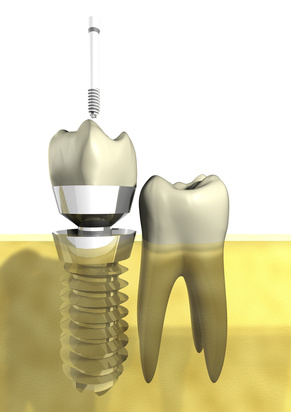Dental Implants: Say goodbye to denture adhesive

Because they are connected to the jaw, dental implants that support a denture offer a much more secure fit than a dental adhesive does. Adhesives fail from time to time, but the link between the appliance, the implant and the jaw all but renders embarrassing denture slip-ups obsolete.
After an oral surgeon places dental implants, the bone in the jaw grows around the implant and forms a bond with its surface. Because this bond is so strong, dental implants can be used to securely anchor a denture.
In addition to giving denture wearers a sense of security, dental implants also help to preserve the contour of your jaw, which means that your appliance will retain its fit over time, as well. A conventional denture lacks a root-like structure under the gumline that holds the jawbone in place, so it will erode over the years after tooth loss.
Implants, however, halt this process, which is known as resorption. When resorption proceeds, the jaw’s shape eventually changes so much that the original denture no longer fits and it needs to be re-lined and even replaced.
Another area in which dentures and denture adhesives fall short is in the chewing mechanism. Dentures that are attached to the jaw by adhesives alone are not able to withstand as strong chewing forces as natural teeth can. More structurally complete, dental implants are better equipped to chew because they are connected to the jaw.
Patients who are dissatisfied with the fit and stability of their dentures and want to ditch the denture adhesive should explore dental implants as an alternative. Contact the Charlottesville office of Dr. Carlos Ibanez to determine if dental implants are a good option for you.